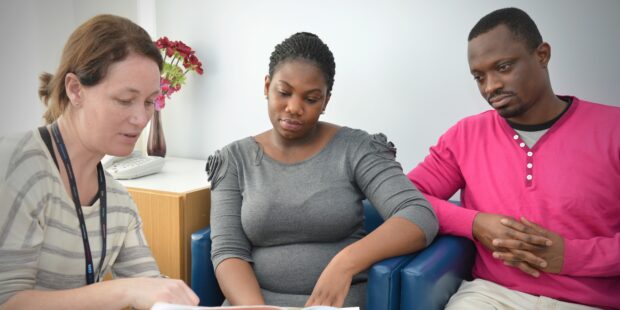
I’ve been an antenatal and newborn (ANNB) coordinator for just over a year. It's a rewarding role and I really enjoy it, but it can also be challenging coordinating the 6 ANNB screening programmes as well as counselling women who have screen positive results across any of the programmes.
One of these programmes is the sickle cell and thalassemia (SCT) screening programme. It’s vital women who screen positive for sickle cell or thalassaemia in pregnancy receive appropriate and timely consultations with trained genetic counselling professionals. This helps individuals and their families understand the results and make decisions for a pregnancy when both parents are identified as carriers for a haemoglobinopathy.
I recently completed a course in genetic risk assessment and haemoglobinopathy counselling at King’s College London. I’ve written 2 case studies of my experiences counselling women and their families following a screen positive sickle cell or thalassaemia result, which were recently published in the British Journal of Midwifery.
What the case studies found
The case studies show individuals and families can interpret information regarding genetic risk and haemoglobinopathy status very differently, depending on the context in which it’s provided. The information can be daunting, as well as beneficial.
The case studies also highlight the social, cultural and ethical dilemmas individuals may face if identified as carrying a haemoglobinopathy, regarding both themselves and their unborn baby.
Antenatal genetic counselling is important for enabling people to make informed decisions based on their wants and needs. An individual’s view on parenthood, disability and social, cultural and religious influences may affect their decision to accept or decline screening.
As genetic counsellors, we have the knowledge and skills to interpret and explain genetic information about SCT. As well as knowing the potential impact a screen positive result may have, we also need to be aware of our own frame of reference, background and experiences. For example, in the case studies I discuss how my personal experience of having my young son diagnosed with an acute blood disorder could impact my counselling abilities.
Self-reflection is crucial and by being aware of any personal ‘blind spots’ we can assess our personal strengths and limitations. By doing this, we can use our own life experiences to be more empathetic, compassionate and understanding, and hopefully communicate in a supportive way.
Reflections on the course
The genetic counselling course widened my knowledge about the responsibility involved in counselling individuals who screen positive for sickle cell or thalassaemia.
I learned about the importance of establishing a therapeutic relationship with pregnant women and their families. These relationships can have a lasting impact on further therapy, either positive or negative. When done well, they are extremely beneficial and will help women to make a balanced decision regarding next steps after screening positive for sickle cell or thalassaemia.
The course was engaging and interactive and was also a great opportunity to meet other ANNB coordinators from across the UK and learn from each other. In my local trust we’ve since made some changes to where we counsel women to make it more suited to the sensitive nature of genetic counselling.
The course also provided me with opportunities to make stronger links with specialist haematology services, both locally and further afield. This means I can ensure women with screen positive results can access these in a timely manner.
I would highly recommend the course, and I hope my case studies encourage others to reflect on how SCT screening may impact on women, babies and their families.
PHE Screening blog
The PHE Screening blog provides up to date news from all NHS screening programmes. You can register to receive updates direct to your inbox, so there’s no need to keep checking for new blogs. If you have any questions about this blog article, or about population screening in England, please contact the PHE screening helpdesk.